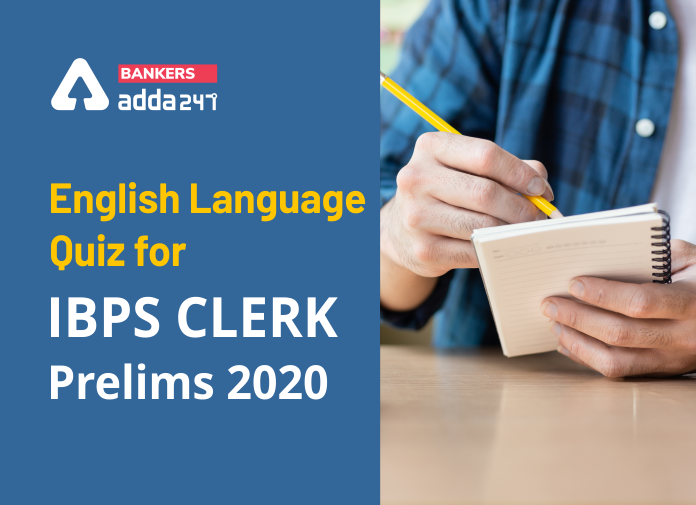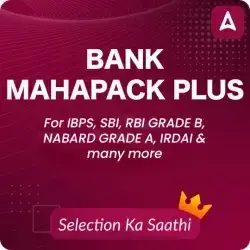Direction (1-5): Rearrange the following sentences to form a meaningful paragraph and then answer the questions given below them.
(A) Likewise, the initiation of the NPA resolution process has brought in a certain degree of rigour, but it still lacks the credibility to be called a bold or successful initiative.
(B) Also, the RBI is doing its best, and even stepping into executive functions like scrutinizing NPA accounts and issuing directives to banks.
(C)It should evaluate the bottlenecks within its domain and bring in the appropriate enablers to help resolve the NPAs at the earliest.
(D)As they say, you can lead a horse to water, but cannot force it to drink.
(E)The banks are taking the required actions to the extent of their respective abilities and governing atmosphere.
(F)However, the government has not yet stepped up to the requirements.
Q1. Which of the following is the THIRD sentence of the paragraph so formed?
(a)A
(b)B
(c)C
(d)D
(e)E
Q2. Which of the following is the FIRST sentence of the paragraph so formed?
(a)D
(b)F
(c)E
(d)A
(e)B
Q3. Which of the following is the SIXTH (LAST) sentence of the paragraph so formed?
(a)E
(b)C
(c)D
(d)F
(e)B
Q4. Which of the following is the SECOND sentence of the paragraph so formed?
(a)F
(b)D
(c)A
(d)B
(e)E
Q5. Which of the following is the FOURTH sentence of the paragraph so formed?
(a)B
(b)D
(c)F
(d)A
(e)C
Directions (6-15): In the following passage there are blanks, each of which has been numbered and one word has been suggested alongside the blank. These numbers are printed below the passage and against each, five options are given. In four options, one word is suggested in each option. Find out the appropriate word which fits the blank appropriately. If the word written alongside the blank fits the passage, choose option ‘e’ (No correction required) as the correct choice.
The Centre would like us to believe that the Smart Cities Mission will transform urban life in the agglomerations that enter the elite club. With the latest inclusions, there are 90 cities in the list, each of which want (6) to turn ‘smart’, utilising core funding from the Centre and other resources (7). By all accounts, the provision of basic services in urban India has been despairing (8), and this is clearly reflected in the winning city proposals: 81 of the selected plans seek wealth (9) for affordable housing, new schools and hospitals, and redesign of roads. This is at best a partial list, and there are many more aspects to achieving inclusivity. There is a high-visibility campaign around the Smart Cities Mission, but there is little evidence to suggest that State and local governments have either the fine-grained data or the intelligent (10) to analyse them in order to understand the discharging (11) needs of their communities. The Centre has apparently decided to skirt such a fundamental problem by admitting (12) a ‘managed urbanisation’ approach in the chosen cities, with the powers of municipal councils delegated (13) to a Special Purpose Vehicle (SPV), under the Companies Act, that will act in its own dexterity (14). Given that this is the model adopted by the two-year-old Mission, the Centre must present a status report on what the SPVs had been(15) achieved so far.
Q6.
(a) brings
(b) expect
(c) proposes
(d) resolves
(e) No improvement required
Q7.
(a) solutions
(b) agencies
(c) methods
(d) schemes
(e) No improvement required
Q8.
(a) worsening
(b) threatening
(c) menacing
(d) dejecting
(e) No improvement required
Q9.
(a) investments
(b) assets
(c) resource
(d) funds
(e) No improvement required
Q10.
(a) effective
(b) capability
(c) influence
(d) versatility
(e) No improvement required
Q11.
(a) happening
(b) adopting
(c) evolving
(d) extending
(e) No improvement required
Q12.
(a) adopting
(b) approving
(c) assuming
(d) acquiring
(e) No improvement required
Q13.
(a) substituted
(b) routed
(c) anointed
(d) committed
(e) No improvement required
Q14.
(a) experience
(b) understanding
(c) ability
(d) wisdom
(e) No improvement required
Q15.
(a) had not
(b) has
(c) have
(d) has been
(e) No improvement required
Practice More Questions of English for Competitive Exams:
Solutions
S1. Ans. (e)
Sol. The correct sequence to form a meaningful paragraph is DAEBFC.
S2. Ans. (a)
Sol. The correct sequence to form a meaningful paragraph is DAEBFC.
S3. Ans. (b)
Sol. The correct sequence to form a meaningful paragraph is DAEBFC.
S4. Ans. (c)
Sol. The correct sequence to form a meaningful paragraph is DAEBFC.
S5. Ans. (a)
Sol. The correct sequence to form a meaningful paragraph is DAEBFC.
S6. Ans. (c)
Sol. “proposes” is the correct word as it means put forward (a plan or suggestion) for consideration by others.
S7. Ans. (e)
Sol. “resources” is the correct word in context of its meaning to the sentence. Hence it doesn’t require any correction.
S8. Ans. (a)
Sol. “worsening” is the correct word replacement as it means making or becoming worse.
S9. Ans. (d)
Sol. “funds” is the correct word replacement as it means financial resources.
S10. Ans. (b)
Sol. “capability” is the correct word replacement as it means the power or ability to do something.
S11. Ans. (c)
Sol. “evolving needs” is the correct phrase in context of its meaning to the sentence. The word evolving means developing gradually.
S12. Ans. (a)
Sol. “adopting” fits the sentence perfectly as it means choose to take up or follow (an idea, method, or course of action).
S13. Ans. (e)
Sol. “delegated” is the correct word as it means entrust (a task or responsibility) to another person, typically one who is less senior than oneself. Hence it doesn’t require any correction.
S14. Ans. (d)
Sol. “wisdom” is the correct word replacement as it means the fact of being based on sensible or wise thinking.
S15. Ans. (c)
Sol. “have” is the correct grammar usage than “had”.
Practice with Crash Course and Online Test Series for IBPS Clerk Prelims:
- Bank Test Pack Online Test Series (12 Months)
- IBPS Clerk Prime Online Test Series 2020 by Adda247
- IBPS Clerk 2020 Online Coaching for Clerk Prelims | Complete Bilingual Batch by Adda247




 English Language Quiz For Bank Foundatio...
English Language Quiz For Bank Foundatio...
 English Language Quiz For SBI Clerk Prel...
English Language Quiz For SBI Clerk Prel...
 English Language Quiz For SBI Clerk Prel...
English Language Quiz For SBI Clerk Prel...








